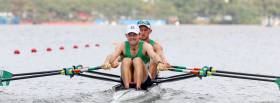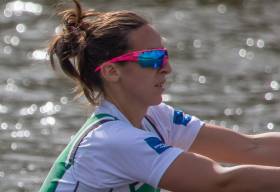Displaying items by tag: European Rowing Championships
O'Donovans Back on Track And Into European Final
#Rowing: Ireland’s Paul O’Donovan and Gary O’Donovan took an excellent second place behind Olympic champions France to secure their place in the A Final of the lightweight double sculls at the European Rowing Championships in Racice today. France were outstanding throughout the 2,000 metres and won by a length. Ireland were sixth at 500 metres, but began to move up the field in the second quarter. They moved through Greece and Germany before the end and saw off a challenge by the Germans coming up to the line – by eight hundredths of a second.
Italy won the second semi-final from Britain and Poland – but in a much slower time.
European Rowing Championships, Day Two (Selected Results; Irish interest)
Men
Lightweight Double Sculls – Semi-Final One: 1 France (P Houin, J Azou) 6:35.68, 2 Ireland (G O’Donovan, P O’Donovan) 6:38.09, 3 Germany (L Schaefer, J Osborne) 6:38.17; 4 Czech Republic 6:41.86, 5 Greece 6:49.59, 6 Spain 7:02.70.
Semi-Fnal Two: 1 Italy 6:43.71, 2 Britain (P Chambers, W Fletcher) 6:45.29, 3 Poland 6:46.49.
Women
Lightweight Single Sculls – Semi-Final One: Switzerland (P Merz) 7:39.48, 2 Ireland (D Walsh) 7:42.53, 3 Italy (C Guerra) 7:43.99.
Semi-Final Two:
1 Sweden (E Fred) 7:36.74, 2 Russia (A Lebedeva) 7:37.90, 3 Germany (L Pieper) 7:42.46.
Denise Walsh Secures A Final Spot at European Rowing
#Rowing: Denise Walsh qualified for the A Final of the lightweight single sculls by finishing second in her semi-final at the European Rowing Championships in Racice today. The race was won, with a dominant peformance, by Patricia Merz of Switzerland. She started well, built a clearwater lead by halfway and showed no weakness as Walsh tried to reel her in in. Italy’s Clara Guerra took third place and the other A Final spot.
In the second semi-final, Sweden’s Emma Fred won in a slightly better time than Merz’s, but she was pushed by Anastasia Lebedeva of Russia and Germany’s Leonie Pieper, who took the remaining A Final slots.
European Rowing Championships, Day Two (Selected Results; Irish interest)
Women
Lightweight Single Sculls – Semi-Final One: Switzerland (P Merz) 7:39.48, 2 Ireland (D Walsh) 7:42.53, 3 Italy (C Guerra) 7:43.99.
Semi-Final Two:
1 Sweden (E Fred) 7:36.74, 2 Russia (A Lebedeva) 7:37.90, 3 Germany (L Pieper) 7:42.46.






























































